Love is love is love is love. We’ve all heard it, and yet that message seems to still fall on deaf ears. We live in unique times, trying times, and what better way to draw the line in the sand and then make our stand than through art? Launching its inaugural production, the new theatre company, Pink Pen Theatre, is proud to present Think Pink! a gay play festival featuring ten world premiere short plays (and one Baltimore premiere short play) from local playwrights, giving voice to the LGBTQ+ community in one of Baltimore’s finest art-forms: Live Theatre. Directed by William Kamberger, the production features 11 plays, 10 actors, seven plays, and a whole lotta love.
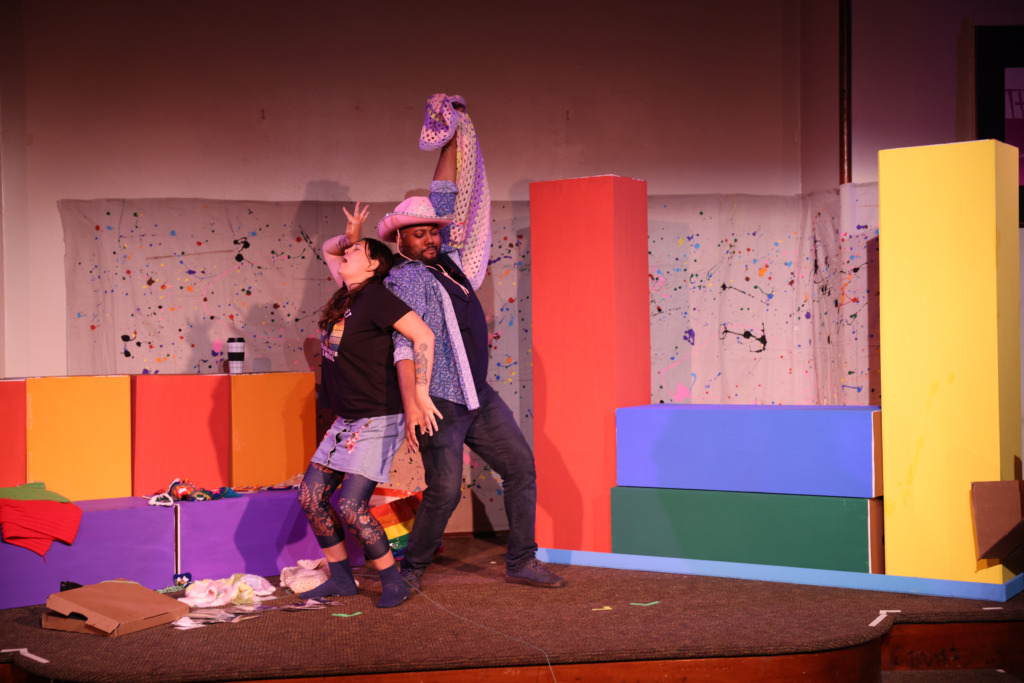
Technically speaking, the show is simplistic, but it almost has to be when you’re launching 11 new works in a ‘found-space’ style theatre, with a ‘up-n-coming-theatre’ budget. Set Designer John Seeley crafts a clever and creative solution with what I’m going to affectionately call “The Rainbow Blocks.” And they are their namesake; noticeable building blocks, painting in pride-flag colors, that are able to be moved and shifted to create the scenery for each of the plays. Some take place in apartments or houses, some take place outside, one even takes place in a church, so the versatility of these blocks— as well as the stance of solidarity they create at the show’s conclusion (a beautiful surprise that I don’t want to spoil) is quite impressive. The scenery of these blocks is offset by a series of projections (designed by Seeley, Kathy Caase, and Nick Logue of SL Show Tech) for each of the plays. They start with the title of the play and the playwright and then switch to a scenic backdrop appropriate for each work. The projector as a whole seemed a little unfocused for the night I was there, causing some of the images to appear less sharp than they could have been, but otherwise, it was an added aesthetic component to the performance as a whole.
The show’s primary downfall is its running time. And it’s not for a lack of good pacing in each of the productions or even the transitions between each play (cleverly covered by having different actors sing acapella segments of appropriately themed musical songs that match the next work to be presented.) One of the works, Dammit, Janet and Nancy Delancy” by DC Cathro, which appears as the second work featured in the second act of the evening, is a good deal longer than the others and just doesn’t gel with the other ten works quite as well as they do with one another. In saving this particular work for another festival or workshopping at another point in time into a full-length play (as it feels like it’s calling out for exactly that) may have solved the show’s running time issue and given these carefully cultivated collection of new works a tighter feel. Director William Kamberger arranged the eleven works in a decent running order, though it feels like there is a way to potentially rearrange this is in a way that allows some of the more potent plays to land with a greater impact. Don’t Wait by Jamie McElhatton, which is currently situated as the penultimate play in the production, would have a much stronger impact if it were the closing work of the first act. (Originally one could say it should be the closing piece of the evening until you see the symbolism behind the way Kamberger chooses to end the performance on the heels of the final play This Corner Church by Emily Scott.) Ultimately it’s directors choice, as the works are solid enough to stand on their own, mostly, but sometimes arranging them for maximum emotional impact causes the audience to feel them that much harder.
The Morning After the Fall by John Bavoso
Opening the festival with a humorous, yet heartfelt poignant piece is a great way to start. John Bavoso, who has three separate works featured in this festival, has a clear handle on how to infuse humor into a serious situation. In this particularly play, Adam (Anthony Case) and Steve (J Purnell Hargrove) are having a discussion. And not just any discussion— this is that Adam. You know, fig-leaf-wearing, Garden-of-Eden, biblical beginnings Adam? Case, who plays Adam, delivers this subtle, shamed introvert who has fear and uncertainty, which is the polar opposite of Hargrove’s Steve, who is sassy and sharp and delightfully on fire with some of those quippy zingers. “You can’t have your forbidden fruit and eat it too!” has to be the funniest line of this work. Bavoso may have set the play in the biblical garden of Eden, but it’s got a modernity to it. Choosing the ‘norm’ because you thought it would be easier, staying in the closet because father knows best; these are both concepts that get contextually layered into Bavoso’s work, fitting this ‘alternative biblical narrative’ divinely while still resonating with present day situations. The work itself is really smart because it frames up ‘Adam leaving the Garden of Eden’ just not in the way you expect.
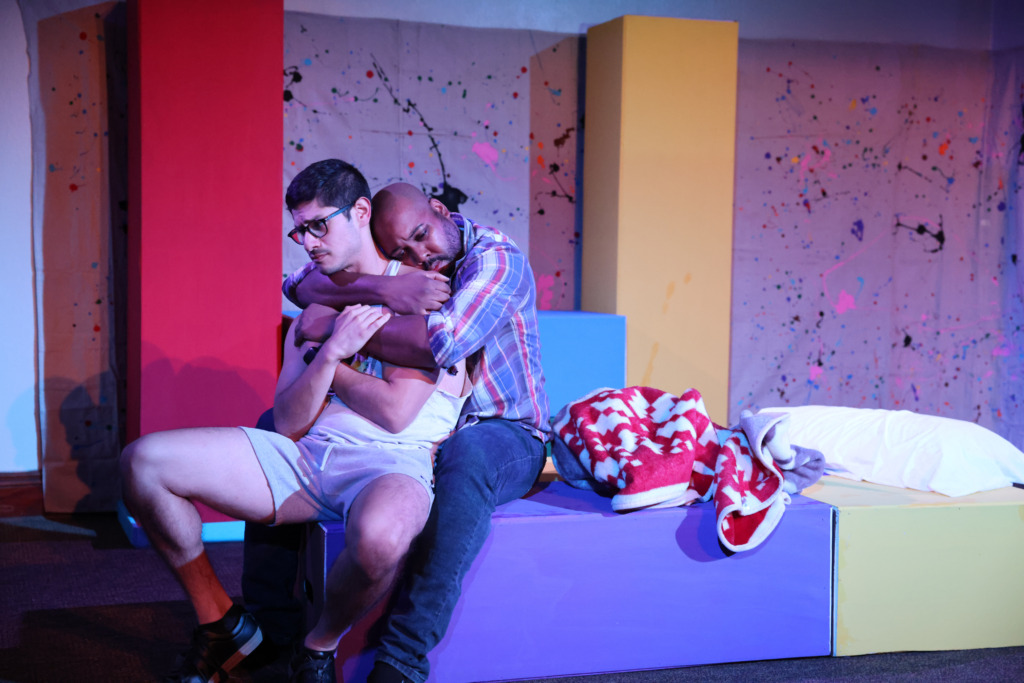
Blackout Wednesday by John Bavoso
For as humorous as Bavoso’s first work was, his second entry into the festival is a bit of a head-scratcher. It’s not that it’s not poignant— it is, because it touches on relationships and how to cope with differing levels of expectation and what a gay relationship looks like to both parties who came from the same place but ended up in different places, both physically and metaphorically in their lives. The subject matter is brilliant; the setup and the phrasing, somewhat convoluted. Bavoso sets this one in the ‘early days of the pandemic’ but this doesn’t actually seem to play a factor in the stakes for the two characters. They sneak off and meet in the woods, but there’s no big deal made about that fact that they’re doing so when we’re supposed to be socially distancing or that it’s dangerous for them to be doing so, etc. There’s a joke or two about the mask that one of the characters is wearing at the start, but as the exchange between them feels universal to any time in anyone’s life, it seems an odd choice to specifically set it at the ‘early days of the pandemic’ without having that be a critical component to the plot progression. At its core, Blackout Wednesday seems to be about sending the message of honoring your true self— in this case being out and open in public and rising above and beyond small hicktown life in order to so so— and its pandemic setting just feels off. Its also a short work and Bavoso takes much too long to address the characters by their name. It isn’t until halfway through their meeting that one of the character’s calls the other by their name, and if you’re going to wait that long to address them, why name them at all, just call them Man 1 and Man 2? Introduce names of characters much, much sooner in a short work so that the audience can more readily connect to them. The two actors in this production, Todd Krickler as Frank and Morgan Staton as Theo, are both skilled and present these characters with strong senses of stage presence in mind. But again with a short play, Bavoso could get a much more powerful impact from this work if he got to the importance behind Frank and Theo’s late-night-middle-of-the-woods meetup sooner. It takes almost as long for the audience to learn the characters’ names as it does for the significance behind this meetup and their relationship dynamic to be revealed. Blackout Woods doesn’t feel like a complete work so much as a scene drifting in search of the full-length play that it came from.
The Cardinal by DC Cathro
Any play featuring an elderly Catholic mother and her young gay son that contains the lines—
“It was a hermaphrodite.”
“No. It was a cardinal.”
— has the potential to be delightfully humorous. And DC Cathro does not disappoint with this one. His strongest work of the three that he has featured in the production, The Cardinal has a universality about it that transcends both the relationship and religious overtones of the work. Though the dialogue, at first, is a little on the dismissively repetitive side, Cathro brings real heart to these characters— a tall order for such development in so short of a time frame. You have a stalwart, hyper-religious mother, simply called Mom (Nancy Kelso) and her progressive, very openly gay son, Caleb (Anthony Case) banging heads together over religious beliefs and homosexuality. There’s a beautiful irony in the way Cathro presents this message as well. The mom sees this beautiful bird, can’t stop gushing about how it’s a sign from heaven, possibly her late husband, and is pouring a waterfall of praises about this gorgeous sight, right up until Caleb points out that the bird is actually a rare hermaphrodite, to which Mom suddenly changes her tune. Both Case and Kelso perfect the nuances of their characters and the intense relationship between them; its obvious from jump street how strained the mother-son situation is, and how very set-in-her-ways the mother is. Kelso gives a textbook presentation of a curmudgeonly assbackwards old lady, stuck in her dated Christian beliefs while Case tries not to throttle her out the window for being a product of her raising. It’s deceptively simple and yet beautiful as a stand-alone play.
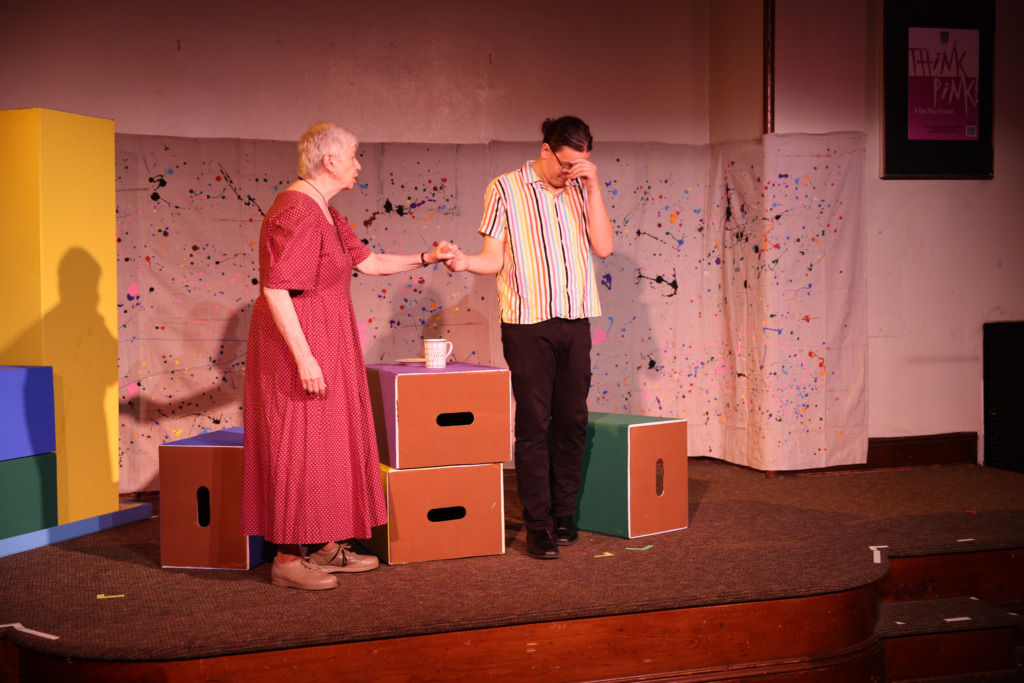
Roadkill by DC Cathro
Bud (Christian Gonzalez) and Charlie (J Purnell Hargrove) have an estrangement in their relationship until Bud turns up, unannounced, unexpected, and uninvited in Charlie’s bed one night, much to Charlie’s shocked, panicked, surprise. This one is difficult to digest and process, not because it doesn’t have a solid meaning behind it or because there’s a problem with the actors— there isn’t— but because the pacing got thrown off kilter somehow? It just has a sleepiness to it that drags. The play feels like it wants to be a quick, five-minute flash-play; let it. Hargrove is playing a grounded character who has clearly had enough of Bud’s nonsense over the years, and Gonzalez is delivering a character who is having some sort of reckoning moment that is really profound to watch, even if the actual reckoning is a bit bizarre. There’s a truly striking moment where Gonzalez’ character begs Hargrove’s character to believe that Bud’s experience is truth, and the Charlie character blatantly states he can accept that Bud believes it to be Bud’s truth but it is not Charlie’s truth. The ending, which reads cleanly on its own, is thrown into a bit of unsettled confusion by the odd projection on the screen at the very end. The projection feels unnecessary, bordering on changing the meaning of the story and might be misconstrued as something else.
Baptism by William Kamberger
This play is arguably the hardest to watch of the eleven being presented because it is so emotionally distressing, while being deeply cathartic. This work is a striking examination on what the grief of loss can do to the human psyche, spirit, and soul. And how you go about processing that grief, in this particular case, that of a romantic, marital partner. Todd Krickler and Morgan Stanton team up again, this time playing Bob and Guy. The semi-autobiographical piece grounds its roots in Kamberger’s personal experience and is dedicated to the memory of his late husband, Dr. Guy Wolf II. The peace is powerful; the words are simple, straightforward, and meaningful. If there’s a minor note it’s the busy projection happening in the background. The sunlit heavens, cloudy skies do exactly what Kamberger intends for them to do by way of setting the mood, but the piece is astonishingly deep and moving on its own; the movement of the clouds, flipping after a few moments to a different cloud projections, is just a little distracting and detracts from the beauty of the work. The setup of this play reads as a cross between an imagined final conversation and the blurred lines of reality when it comes to saying goodbye. How do you move forward after loss without feeling like you’re moving on or being dishonest to the memory of the loved one that you lost? It’s definitely a call for tissues. Krickler and Stanton do a phenomenal job of encompassing all of the emotions, including little drops of humor, that surround the process of grieving a marital partner, but the profound sense of loss and grief and love that Kamberger has imbued to this script transcends specificity, allowing the universal concept of loss and grief and love to be relatable to anyone who has experienced loss of a loved one, regardless of the nature of the relationship. There is magical power in the notion of forgiveness of one’s self, leading to healing and relief.
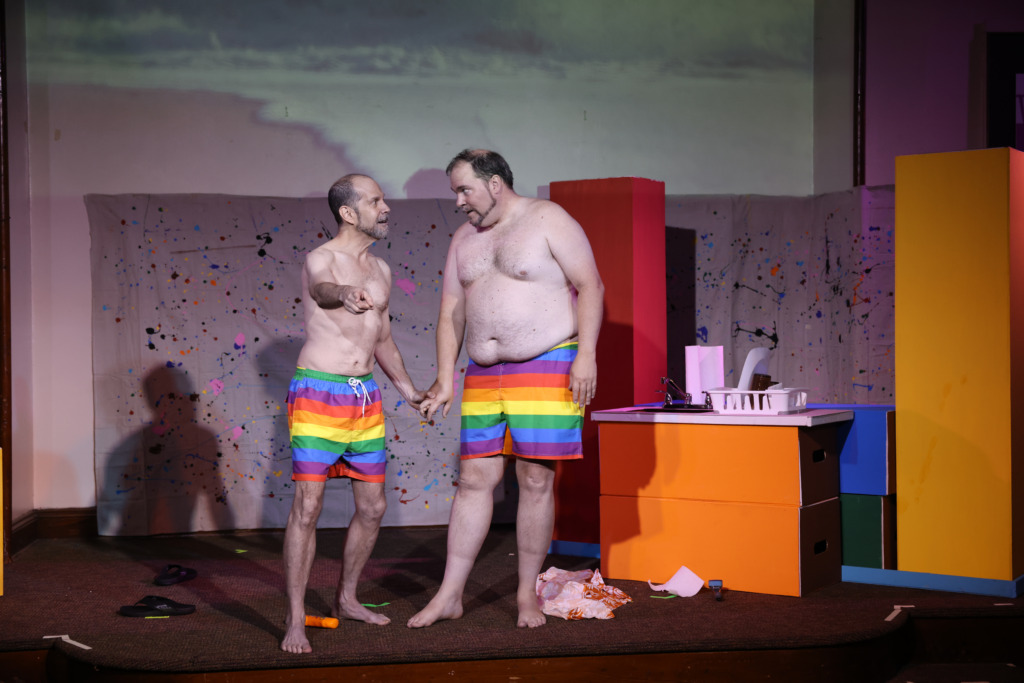
Hooked by Steve Satta
After plumbing the emotional trenches with Kamberger’s Baptism, Steve Satta’s quirky piece is the dose of laughing medicine the doctor ordered. Zany and humorous, this little play even features an absurd dream sequence, and touches delicately on loss of a different variety. Satta focuses the work around Anna (Cellina Denaro Taormino), a lesbian woman going through, or rather existing on the other side of, a break-up. And the vessel of crocheting, via the in-name-only ‘Grandma Charlie’ character, is the ship that navigates the protagonist through the whacky seas of ‘how to get over the end of a bad relationship.’ With Louisa Davis as Carla the delivery girl (and dream-characters Betsy Ross, Julia Roberts, and Sutton Foster, because why not?) and J Purnell Hargrove as ‘best friend’ Casey, it’s a rollicking uproarious romp in coping, infused with healthy and hearty doses of humor. Hargrove is once again delivering A-level sass as the Casey character while both Davis and Taormino play slightly more grounded characters, with Taormino delivering a mercurial performance that whirlwinds its way through a cacophony of emotional flavors— including rage-fury. It’s really a solid pick-me-up, perfectly placed in its slot of the show’s running line-up.
When We’re Ninety by Rich Espey
Another powerfully potent and emotional exploration, though from a different perspective, Espey’s work brings two 90-year-old married men— Russ (Todd Krickler) and Ben (Richard Goldberg) together at the end. Make of that what you will because it’s incredibly difficult to discuss the tragic beauty of Espey’s piece without giving away the entirety of the plot or spoiling the ending. What I can say is that both Krickler and Goldberg masterfully portray 90-year-olds. Everything from the pinched and worn-out vocal affectations to the way they shuffle and shamble about the— I think it’s an Air BnB, the setting— it’s incredibly believable. Espey also has brief scenes that flash back some sixty years, showing both of the characters as their younger selves, wildly and passionately in love, living and thriving in the prime of their life. The play, whose ending is truly tragically beautiful and beautifully tragic, slips back into a flashback to end on a bittersweet happier note and that is remarkably perfect. It is such a well-paced, beautiful peace, that you almost don’t notice that the characters never address each other by name on stage. They refer to each other as ‘my wonderful guy.’ While not introducing the characters may be problematic in some works, the relationship is so well-established right from the moment you zoom in on our their lives, you never question it. This is an exceptional work and provides a sense of balance to both of the works that appear immediately before it, as it has threads of both woven into its existence.
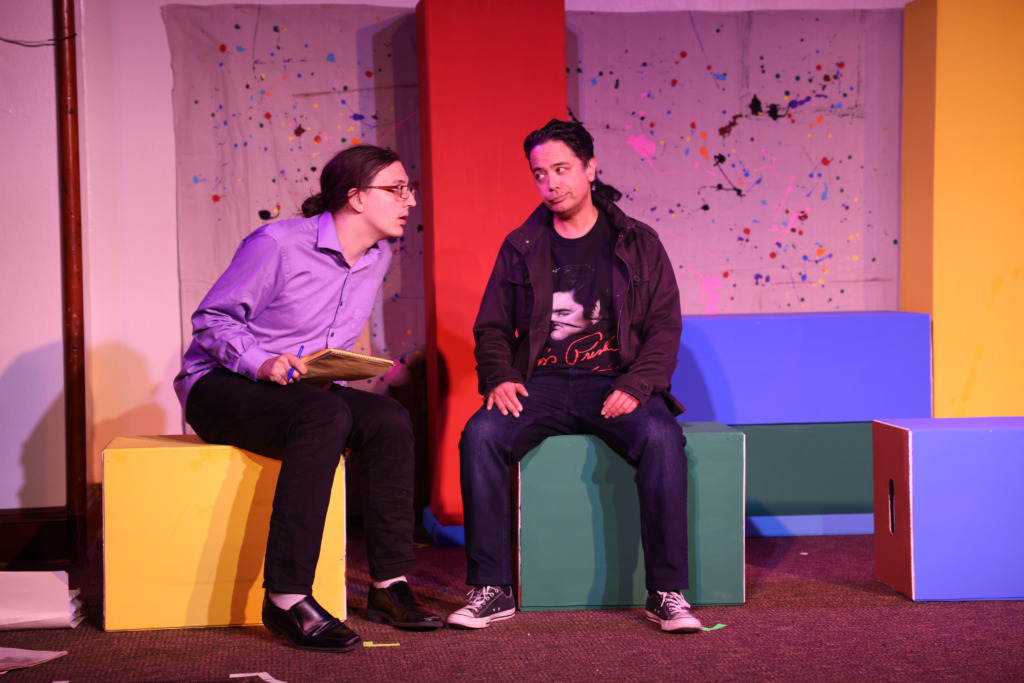
Direct Deposit by John Bavoso
This one takes the cake of the three Bavoso wrote in the production. It’s witty, it’s hilarious, the actors are given something surprisingly deep to sink their teeth into, it’s a little gritty, a little scandalous, and sends a tremendously impressive message. Ray (Morgan Stanton) and Aiden (Anthony Case) are two strangers are an undisclosed…waiting room…of sorts. When Stanton’s character strikes up conversation, if you’re clever or of a slightly less-than-naïve mind, it becomes highly humorous as they dance all around, however briefly, where exactly they are and what exactly it is they’re doing. It almost has elements of farce threading the opening together. The two actors nail these character stereotypes with perfection. Stanton is just the epitome of that chatty, slightly obnoxious, “I’ll talk to anything that looks like it might talk back” stranger who can’t help himself while Case plays a nervous, jittering, frenetically obsessive introvert. Stanton delivers whip-smart accuracy with the comedic zings and understands the timing of the dialogue exchange while being in possession of gritty charm that just makes him enjoyable. Case delivers neurotic realism that is explosive and dynamic and just a treat to watch. And the ending goes profoundly deep for a few seconds; it’s an excellent way to open the second act of the festival and my personal favorite among the eleven works presented.
Dammit, Janet and Nancy Delancy by DC Cathro
This is the work that feels like it’s in the wrong story. Yes, it fits the festival criteria but it just doesn’t gel well with the others. And it’s incredibly lengthy by comparison, requiring a full stop for Part 1 and Part 2. This work of Cathro’s on the whole feels as if it’s a workshop for a larger, full-length version of what might someday be a completed play about these characters— if you can get past the cringe factor of the opening part. Entitled sociopath Janet (Cellina Denaro Taormino) drops back into supposed BFF, Delancy (Christian Gonzalez)’s life, after four years of being completely absent, and within minutes of being together drops the bomb of ‘get me prgenant’ on her gay, best friend, who is in a married, committed relationship, just like she is. And it devolves from there. The Delancy character doesn’t even begin to scratch the surface of how screwed up this is when he says “No. This is a hot box of crazy.” It doesn’t read as cutesy or funny, just a whole hell of a lot of insane, cringey, desperate, and gross. Who does that to people? And Taormino’s character is psychotically manipulative in a ‘fun’ way that is probably going to be extremely triggering for anyone who’s ever been in an emotionally manipulative or abusive relationship.
And then Part 2 takes a turn for the trite. You know straight away, before either the Delancy character or the Barry (Todd Krickler) character, even say anything that yes, Delancy did decide to knock Janet up, along with all the crazy terms like “let’s not tell my husband Barry you’re the father.” And you also know straight away that Delancy and Barry are at Nancy’s funeral. And it becomes this angsty moment of slow-agony as to when the Delancy character is going to bust out with the truth. But then to try and blindside either the audience or the characters or perhaps both, the Delancy character never does. Cathro has an idea, there’s no doubting that, and is an impressive playwright, generally speaking, this just feels like a workshop piece still in development and has a whole lot of cringy triggers that without context or extended scenes to really build up the characters, just doesn’t work stand alone.
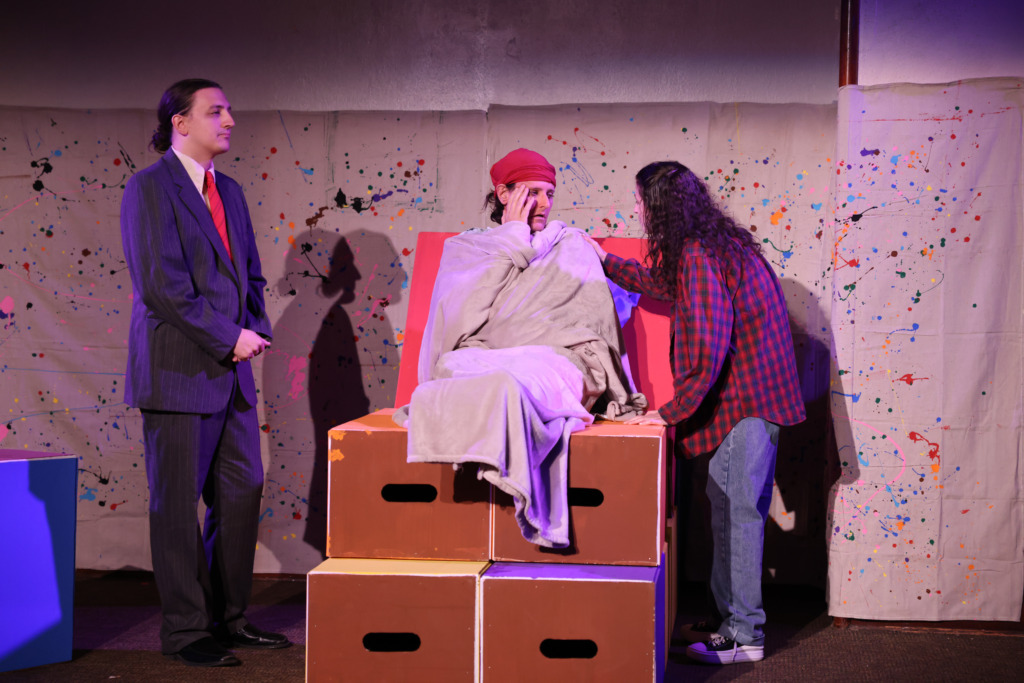
Don’t Wait by Jamie McElhatton
Another beautiful piece of carefully crafted, poignant message-sending that doesn’t feel as if it’s bludgeoning the audience with the very earnest, very important message it is trying to send out into the world. Again, deceptively simple in its framework, McElhatton has crafted a ‘death-bed’ moment, where you have Jay (played by McElhatton) and Dana (Louisa Davis) and Michael (Anthony Case.) Jay being the father of the two siblings, in a deathbed, and the truth coming out as Jay is dying. It’s a classic case of a marginalized person, in this case a Trans Woman, trying speak their truth, be their truest self, and only coming into those truths in their final moments. McElhatton does it beautifully, both in writing it and in playing the part. McElhatton has divided the two adult children— one totally accepting child, the daughter Dana, and one off-the-charts-in-denial child, the son Michael. Watching their volatile opposing responses is astonishing. There is a hilarious moment of levity thrown in the mix— McElhatton has crafted the Jay and Michael characters to be congressional seat holders and by proxy of unfathomable wealth— and the exchange the pair of them have with Dana over ‘which Mercedes’ is just hysterical. There’s even a Transgender Flag pillowcase under Jay (that you don’t see until Jay arises from the bed and speaks their epilogue-style truth about the title of the play at the end) which really drives home the importance of accepting people who they are inside. Speak your peace; live your truth; be your best, honest you. Jamie McElhatton does exactly that with this work and it’s a celebratory moment that serves well its spot as the penultimate play in the festival.
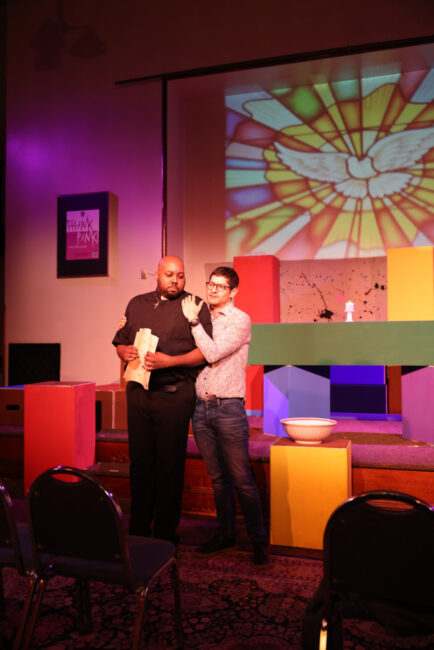
This Corner Church by Emily M.D. Scott
A sobering yet cathartic and peaceful sense of closure, this work by Emily M. D. Scott is, in all actuality, the perfect conclusion to the production. The characters are a little quirky but wholly earnest and truly delightful. J Purnell Hargrove takes up the role of Pastor Jonathan, giving his last words as they close the doors of the corner church one final time, with his husband Paul (Christian Gonzalez) right by his side. Their bittersweet reminiscence is touching and feels deeply truthful. Of course, it would be more of a scene and less of a short play if it was just those two doing their farewells to the building and all that it is and was to and for the community. Add in the tougher than bricks battleax Mrs. Moser (Nancy Kelso) and the quiet and curious Mr. Copeland (Richard Goldberg), who are off-beat in an adorable yet heartfelt fashion, and you have a true expression of memory and meaning… even if you get it from Kelso’s character and Goldberg’s character low-key breaking back into the church (with the convenient spare keys they forgot to surrender) once it’s doors have been closed forever. There’s a touching moment with candle that are passed out and lit in the audience (you can tell who’s attended candle-light service before and who has not) and the finale-finale, which comes after the work closes— is where those Rainbow Building Blocks come into play for something really lovely. It’s a solid closer for the festival.
Ultimately a great showcase of new works; some stronger than others, some that are clearly crying out to be a bigger part of their own thing; Think Pink! is serving the community and lending exposure to voices that need to be heard. It is with great hope that this gay play festival becomes an annual tradition in the Pink Pen Theatre’ repertoire.
Running Time: 3 hours and 15 minutes with one intermission
Think Pink! A Gay Play Festival plays through October 15th 2023 with Pink Pen Theatre at St. Mark’s Lutheran Church— 1900 St. Paul Street in the Station North Arts District of Baltimore, MD. Tickets are available at the door and in advance online.
To read the interview with Director Bill Kamberger, click here. Think Bill: An Interview with Founder Bill Kamberger on Pink Pen Theatre’s Inaugural Playwright Showcase ‘Think Pink!’
